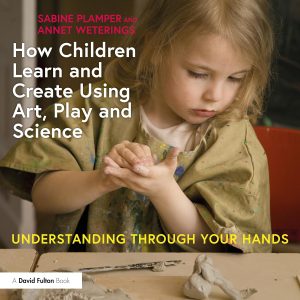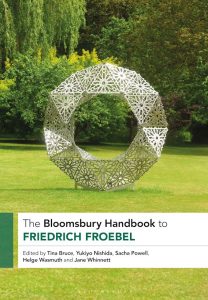Check out this wonderful new book:
How Children Learn and Create Using Art, Play and Science:
Understanding Through Your Hands

This book shows that creativity is so much more than drawing or painting something beautiful. It is a way of understanding the world through your hands and learning through play, art, and science.
Drawing on the Reggio Emilia approach (among others), this book focuses on the process rather than the result and argues that children should be supported in experimenting with materials and mark-making. The authors go against traditional setups where an adult demonstrates how it should be done, showing instead that an inspiring environment and open-ended resources trigger children’s intrinsic motivation. The book shows countless inexpensive possibilities, which require little preparation, and get children in a creative flow. With its appealing full colour photographs, this fully updated English edition offers inspiration, a sustainable and feasible vision, and tools for facilitating creative processes at school, in childcare centers and at home. Full of practical guidance, it is essential reading for anyone working with children wanting to help them develop into self-aware, creative, and responsible people. To order with discount at Routledge Publisher see the code and link at: https://atelierineenkoffer.nl/publicaties/
Review:
Understanding through the hands makes a valuable contribution to early childhood delving into practices of mark-making and the wider visual arts. It has a balance of theory and practice, brought to life with strong illustrative images. Mark-making and the visual arts provide children with opportunities to express themselves and make meaning. Art is a mode of communication as we express our ideas and feelings, and in doing so we develop theories of how the world works. In this way children discover understanding as they make sense of their experiences.
In the book the authors offer a way of working that places the child at the centre of their learning. In the process they will be exploring their ideas, making new discoveries and generating new ideas and new meanings. Their work draws upon a rich heritage of thinkers within arts education, ideas which they have reworked and developed throughout the book, suggesting new contemporary ways of working.
Understanding through the hands was originally written in Dutch. It is a delight this book has now been translated into English to benefit a wider audience. They introduce thinkers that perhaps the English speaking audience are less unfamiliar with such as Stern and Juul. This adds to the breadth that the book has to offer as well as the inclusion of less familiar quotes form an array of educators.
I think this book will inspire and perhaps allow us to reflect more deeply our own practice, and in turn, result in more children having positive experiences and flourishing along the journey.
Pete Moorhouse FRSA, CF – Early Childhood Creative Consultant, Bristol, UK


